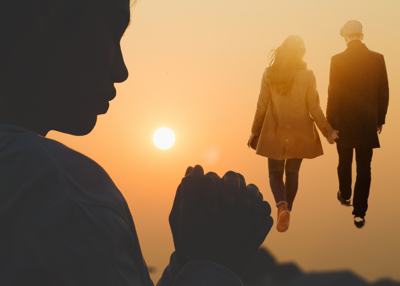
(Design by Denise Florez on Canva)
Religion is deeply woven into the cultural fabric of the Latino community. It provides a sense of identity, values and belonging. However, its influence can also manifest in complex ways, particularly when it comes to matters of sexuality. For many Latinos, navigating the intersection of faith and sexual expression can lead to feelings of shame and confusion, with the potential of impacting their intimate lives.
According to a study published by the National Library of Medicine (NLM), 38% of Latinos report attending church at least once a week. Furthermore, the Public Religion Research Institute (PRRI) estimates that 75% of Hispanic Americans identify as Christians, with the majority adhering to Catholicism or evangelical Protestantism. These traditions often emphasize conservative teachings about sexuality, such as abstinence before marriage, the inviolability of heterosexual unions and the avoidance of behaviors deemed sinful.
For devout Latinos, these teachings often serve as moral guideposts. Yet, they can also create internal conflicts, particularly when their personal desires do not align with religious doctrine.
“[These teachings] go really deep into how we perceive our gender roles and how we perceive our own sexuality […] the shame is based on negative messaging […] that creates fear, hesitation, and avoidance around sexuality, based on not wanting to break the rules, with negative consequences. I think it has very long-term effects because it keeps people from really understanding who they are, sexually,” explained Dr. Shannon Chavez, a Licensed Psychologist and Certified Sex Therapist.
The roots of sexual shame
For many Latino families, discussions about sex are taboo, reinforcing feelings of guilt and impurity. As a result, individuals may struggle to express their needs or seek guidance, leading to difficulties in relationships and self-acceptance.
During the ’90s, “purity culture was such a big movement, to the point where they [churches] were even doing Purity Balls,” explained Dr. Chavez. These events, often involving fathers taking their daughters to formal ceremonies, were “almost a way to show that your virginity does not belong to you. It almost belongs to the patriarch of the family, and that it is definitely tied to your worth.” Within this context, sexuality was framed as something to preserve exclusively for marriage, devoid of personal agency or the idea of pleasure.
By normalizing these beliefs, purity culture imposed restrictive views on young women, shaping their understanding of sexuality as something outside their control. Moreover, the involvement of parents intensified feelings of shame, as disappointing them became a significant emotional burden. This movement failed to provide comprehensive education about natural biological processes, leaving adolescents and young women without the tools or knowledge to navigate their own experiences, promoting anxiety and confusion instead of confidence.
Many of these problematic beliefs have shaped Latino society to this day. Dr. Chavez recalled a conversation with her mother, Cathy Candelaria, where they discussed the generational impact of her Catholic upbringing. Having attended Catholic school, her mother described how the conservative environment imposed strict limitations, such as prohibitions on physical contact and rigid boundaries around relationships, leaving little guidance for navigating intimacy. This lack of understanding often led to feelings of insecurity and shame. Dr. Chavez emphasized that healing involves granting oneself permission to learn, build confidence and take intentional steps toward understanding one’s sexuality.
Impacts on mental and emotional well-being
The effects of religious sexual shame are far-reaching. For some, it leads to anxiety, depression or feelings of inadequacy. Others may experience sexual dysfunction or strained relationships due to an inability to reconcile their faith with their physical and emotional needs. LGBTQ+ Latinos, in particular, often face unique challenges as they navigate cultural and familial expectations while contending with religious condemnation of their identities.
Many individuals face difficulties related to body image, including genital shame. For Dr. Chavez, these struggles can create mental blocks around pleasure, leading to dissociation and even post-traumatic stress stemming from unprepared or distressing sexual experiences. A lack of education about what to expect from sex, how an orgasm works and what is needed to feel comfortable and relaxed can contribute to issues like painful sex, sexual dysfunction and increased anxiety in or avoidance of intimate encounters.
For women, in particular religious women, sexual shame often obscures the understanding that sex should be as much about their pleasure and comfort as it is about their partner's. Without proper education and open communication, navigating sexual experiences can become overwhelming, reinforcing cycles of fear and disconnection.
Moving toward healing
“Disconnection from the body [is] such a big part of the teaching too, because that can lead to so many other concerns around sex,” explained Dr. Chavez. In her practice, early therapy for patients experiencing these challenges often involves granting individuals permission to explore and embrace their own bodies, countering strong messages that discourage self-awareness and self-pleasure, including abstaining from masturbation or avoiding touch. Helping individuals reconnect with their bodies and desires is a crucial step in fostering healthier, more authentic relationships with themselves and their partners.
“As a clinician, I really look at masturbation as not just getting off or stimulating yourself. It is a form of self-care, and it's about being connected to your own body. Masturbation is a form of self-pleasure, but there are many ways that we can embrace self-pleasure, and I always recommend that, initially, before we get into the stimulation part of self-pleasure, we learn about the body. Let's learn to be okay, touching our bodies without shame,” said Dr. Chavez.
Touch serves as the foundation for pleasure. Dr. Chavez suggests starting with simple, intentional exercises—from head to toe—to connect with the body and observe the thoughts and emotions that arise. These thoughts often include feelings of shame, negativity or discomfort with certain parts of the body. By challenging these beliefs, she explained, individuals can develop their own values and build a positive relationship with their physical selves.
Confronting one’s faith while healing from religious sexual shame is a deeply personal and multifaceted process. For some, this may mean fully breaking away to forge a personal spiritual journey or adapting religious practices in ways that align with their values. Others may find healing through integration—embracing progressive approaches, reshaping traditions or engaging in community outreach and advocacy within their faith. These pathways highlight that healing is not a one-size-fits-all process but rather an ongoing journey of self-discovery, reconciliation and agency.











(0) comments
Welcome to the discussion.
Log In
Keep it Clean. Please avoid obscene, vulgar, lewd, racist or sexually-oriented language.
PLEASE TURN OFF YOUR CAPS LOCK.
Don't Threaten. Threats of harming another person will not be tolerated.
Be Truthful. Don't knowingly lie about anyone or anything.
Be Nice. No racism, sexism or any sort of -ism that is degrading to another person.
Be Proactive. Use the 'Report' link on each comment to let us know of abusive posts.
Share with Us. We'd love to hear eyewitness accounts, the history behind an article.